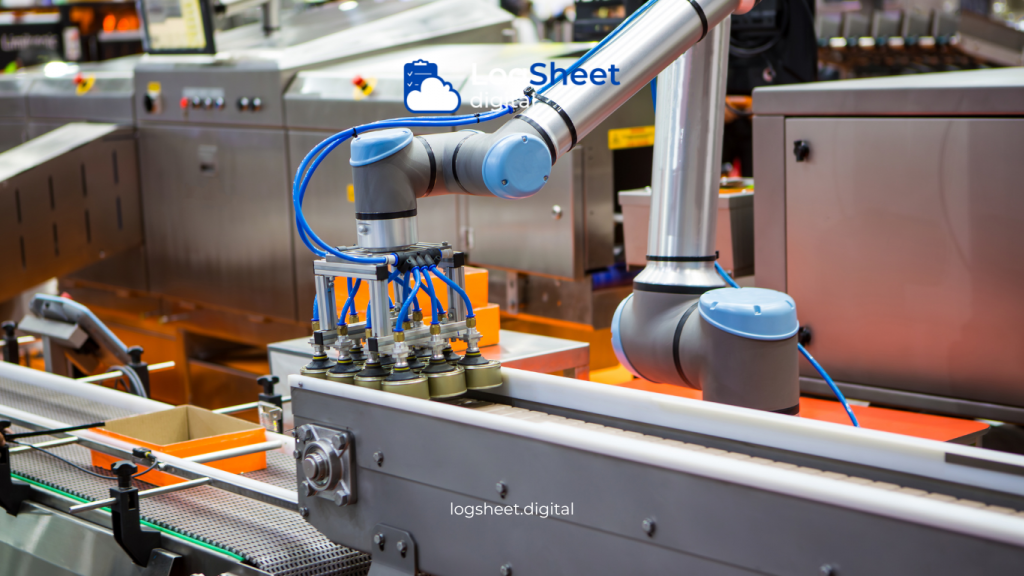In today’s digital era, transparency in the production process has become increasingly important, especially in the food industry. Consumers are now more concerned about the origin of the products they consume, from raw materials to the production process. Therefore, companies need to ensure that every step in the production chain can be monitored and audited. One effective way to achieve this transparency is by using digital logsheets.
Why is Transparency Important in the Food Industry?

Read more: Digital Logsheet: Revolutionizing Equipment Safety Supervision and Maintenance
The food industry is one of the most regulated sectors due to its impact on public health. Regulatory bodies like BPOM in Indonesia and the FDA in the United States require food companies to have strict systems for recording and reporting every stage of the production process. Production transparency not only increases consumer trust but also makes it easier for companies to meet legal requirements and food safety standards.
Limitations of Conventional Logsheets

Read more: Digital Transformation in Safety Equipment Monitoring: The Role of Digital Logsheets
Before the advent of digital logsheets, many companies used paper-based logsheets to record production data. While this system is simple, it has many limitations, such as:
- Prone to Errors: Paper logsheets are easily damaged, lost, or filled in with incorrect data.
- Difficult to Access: Data stored in paper form takes a long time to access, especially if it is needed for audits or analysis.
- Lack of Integration: Paper logsheets are difficult to integrate with other systems, such as production management systems or ERP.
Advantages of Digital Logsheets in Increasing Transparency

Read more: Digital Logsheets: The Latest Solution for Improving Quality Control and Analysis
Using digital logsheets can address various issues faced by paper-based systems. Some of the advantages of digital logsheets in increasing production transparency in the food industry include:
- Real-Time Access: With digital logsheets, production data can be accessed in real-time by all relevant parties. This allows the company to quickly identify and address emerging issues.
- Error Reduction: Digital logsheets are equipped with automatic validation features that reduce the risk of errors in data entry.
- Clear Audit Trail: Any changes or updates to data in digital logsheets can be tracked, making the audit process easier.
- Integration with Other Systems: Digital logsheets can be integrated with production management systems, ERP, and even IoT technology to increase efficiency and data accuracy.
Case Study: Implementation of Digital Logsheets in the Food Industry

Read more: Digital Transformation in Quality Control: The Role of Digital Logsheets in the Industry
One successful example of digital logsheets implementation is in a large food company in Indonesia. Before using digital logsheets, this company had difficulty managing production data, especially when fulfilling audit requests from regulators. However, after switching to digital logsheets, the company significantly increased production transparency and efficiency.
In its implementation, this company used a digital logsheet platform integrated with their ERP system. Every production data entered into the digital logsheet was automatically updated in the ERP system, making it easier for management to monitor overall production performance. Additionally, the company could easily present the data requested by regulators in a short time.
Challenges in Implementing Digital Logsheets

Read more: Optimal Quality: Digital Logsheets & Raw Materials
Despite the many benefits, implementing digital logsheets is not always easy. Some challenges that companies might face in this process include:
- User Adaptation: Employees accustomed to manual systems may need time to adapt to digital systems.
- Initial Investment Costs: Implementing digital logsheets requires an initial investment, which can be substantial, especially for small and medium-sized enterprises.
- Data Security: Companies need to ensure that data stored in digital logsheets is secure from cyber threats.
Strategies for Successful Digital Logsheet Implementation

Read more: Data Security in Digital Logsheets: Challenges and Solutions
To overcome the above challenges, companies can apply the following strategies:
- Training and Assistance: Provide adequate training to employees so they can effectively use digital logsheets.
- Gradual Approach: Digital logsheet implementation can be done gradually, starting with the production areas that most need transparency.
- Layered Security: Use encryption technology and layered security systems to protect production data.
Conclusion

Read more: Digital Logsheets Implementation for Calibration Tracking and Monitoring
The use of digital logsheets in the food industry is an essential step in increasing production transparency. Besides making it easier for companies to meet regulatory requirements, digital logsheets also enable faster and more accurate data access. Although there are some challenges in their implementation, the benefits gained are far greater, especially in the long run. With digital logsheets, food companies can ensure that every production process is well-monitored, increasing consumer trust and the company’s competitiveness in the market.
Key Takeaways:
- Importance of Transparency: Transparency in food production is key to meeting regulatory standards and increasing consumer trust.
- Advantages of Digital Logsheets: Digital logsheets offer more efficient, accurate, and secure solutions compared to paper logsheets.
- Case Study: The implementation of digital logsheets in a food company demonstrated significant improvements in efficiency and transparency.
- Implementation Strategy: Companies need to plan a careful implementation strategy to overcome challenges such as user adaptation and data security.
By adopting digital logsheets, the food industry can move towards more transparent, efficient production, aligned with technological developments in the digital era.





comments (0)